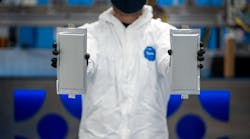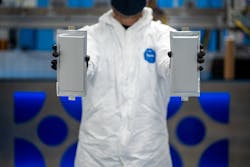What you'll learn:
- Who is Solid Power?
- The benefits of solid-state batteries vs. conventional Li-ions
- Other EV developments from the investors in Solid Power.
BMW, Ford, and Volta Energy Technologies, a venture capital firm spun out of the U.S. Department of Energy's Argonne National Laboratory, are leading a $130 million Series B investment in Colorado-based startup Solid Power. The investment will see BMW and Ford receive production solid-state lithium-ion batteries for electric cars next year. Solid-state batteries promise to offer greater energy density than the lithium-ion batteries that are currently used.
Solid Power is already producing a 20-Ah solid-state lithium-ion battery cell on a high-volume, roll-to-roll pilot line using what’s described as industry-standard equipment.
The sulfide-based cells used by Solid Power deliver more than 50% more energy density, according to the company. The cells were validated by the BMW Group and Ford late last year, and both companies will get full-scale 100-Ah cells for automotive qualification testing and development of upcoming vehicles beginning in 2022. The automakers have agreements to use the technology in upcoming electric vehicles that will arrive by 2030.
Solid-state batteries replace the liquid or gel-form electrolyte found in conventional lithium-ion batteries with a solid, conductive material. It can be lighter, with greater energy density, and provide more range at lower cost. The solid-state battery also improves safety thanks to the lack of flammable components.
“By simplifying the design of solid-state versus lithium-ion batteries, we'll be able to increase vehicle range, improve interior space and cargo volume, deliver lower costs and better value for customers, and more efficiently integrate this kind of solid-state battery-cell technology into existing lithium-ion cell production processes,” said Ted Miller, Ford's manager of Electrification Subsystems and Power Supply Research.
“Volta invested early in Solid Power when our team of energy and commercialization experts found they had not only promising technology, but also a fundamental focus on manufacturability. After all, a breakthrough battery will not find a place in the market if it can't be produced at scale with acceptable costs,” said Dr. Jeff Chamberlain, CEO of Volta Energy Technologies.
Invested in Electric
During the past year Ford launched the 2021 Mustang Mach-E electric, and its electric F-150 Lightning is scheduled to arrive next year. BMW currently has the electric i3 on sale in the U.S. and its i4 sedan and iX crossover are on its near-future introduction list. BMW said that by 2023 it will have fully electric models available for almost all of its market segments.
Ford previously indicated that it will invest $22 billion in electrification through 2025. The automaker is spending $185 million on a lab to develop new manufacturing techniques for lithium-ion and solid-state battery packs for EVs. This 200,000 sq.-ft. facility will include pilot-scale equipment for electrode, cell, and array design. It also will pilot new manufacturing techniques that would allow Ford to scale battery-cell designs with novel materials once the company vertically integrates battery cells and batteries.
Ford’s lab is called "Ford Ion Park." The company is building on nearly two decades of battery expertise by centralizing a cross-functional team of 150 experts in battery technology development, research, manufacturing, planning, purchasing, quality, and finance. The project also will involve work on improving the full production cycle, including research into the mining of needed resources and battery recycling.
Anand Sankaran leads the Ford Ion Park team as its new director. The 30-year Ford veteran is a 1999 Henry Ford Technology Award winner for his electrification work at the Ford Research Lab, and has been Ford director of electrified systems engineering.
In addition to the Ford Ion Park project, the Battery Benchmarking and Test Laboratory in Allen Park, Mich., opened by Ford in late 2020 has 150 test chambers for different types of battery cells. The lab houses battery cell and pack test rooms, test benches and benchmarking facilities to support battery cell design validation, controls calibration, pack development, and pilot battery-pack projects with different chemistries. The lab team can replicate the performance of full-scale production batteries under extreme weather and customer use cases, speeding implementation in future vehicles.
Solid Power, based near Denver, Colo., earlier raised $5 million from BMW iVentures. Its partnership with the Munich-based automaker began in 2016. With its newest investments, Ford and BMW will own equal stakes in Solid Power, which was established in 2012 as a spinout from the University of Colorado, Boulder.

